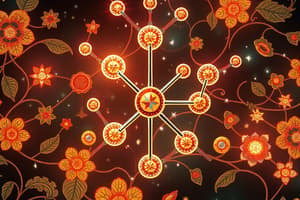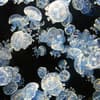Podcast
Questions and Answers
What is the primary effect of activating groups on substituted benzene during electrophilic attack?
What is the primary effect of activating groups on substituted benzene during electrophilic attack?
- They decrease the overall reactivity compared to benzene.
- They influence both the rate of the reaction and the site of attack. (correct)
- They solely determine the rate of the reaction.
- They only affect the reactivity of the ring.
Which position do activating groups primarily direct substitution in during electrophilic aromatic substitution?
Which position do activating groups primarily direct substitution in during electrophilic aromatic substitution?
- Meta position only.
- Ortho and para positions. (correct)
- Equally among all positions.
- None of the above.
When toluene is nitrated, what percentage of the product is expected to be meta-nitrotoluene?
When toluene is nitrated, what percentage of the product is expected to be meta-nitrotoluene?
- 37%
- 96%
- 4% (correct)
- 59%
What is considered an example of an activating group in electrophilic substitution?
What is considered an example of an activating group in electrophilic substitution?
In the nitration of toluene, what is the ratio of ortho- to para-nitrotoluene products obtained?
In the nitration of toluene, what is the ratio of ortho- to para-nitrotoluene products obtained?
Which statement is true about the reactivity of toluene compared to benzene?
Which statement is true about the reactivity of toluene compared to benzene?
What type of directors are groups that lead to a higher reactivity in electrophilic substitution?
What type of directors are groups that lead to a higher reactivity in electrophilic substitution?
What will happen to the reactivity of a substituted benzene ring if a deactivating group is present?
What will happen to the reactivity of a substituted benzene ring if a deactivating group is present?
Which of the following compounds is also known as p-chlorophenol?
Which of the following compounds is also known as p-chlorophenol?
What is the generic name for compounds like o-cresol, m-cresol, and p-cresol?
What is the generic name for compounds like o-cresol, m-cresol, and p-cresol?
Which of the following is a type of benzenediol?
Which of the following is a type of benzenediol?
What functional group characterizes phenols?
What functional group characterizes phenols?
Why do phenols have relatively high boiling points compared to alcohols with similar molecular weights?
Why do phenols have relatively high boiling points compared to alcohols with similar molecular weights?
Which naturally occurring phenol is found in oil of cloves?
Which naturally occurring phenol is found in oil of cloves?
What is the boiling point of phenol?
What is the boiling point of phenol?
Compared to alcohols, how are phenols classified in terms of acidity?
Compared to alcohols, how are phenols classified in terms of acidity?
What are the starting organic compounds in the Cumen hydro peroxide process?
What are the starting organic compounds in the Cumen hydro peroxide process?
At what temperature range does the second reaction of the Cumen hydro peroxide process occur?
At what temperature range does the second reaction of the Cumen hydro peroxide process occur?
What type of reactions do phenols readily undergo?
What type of reactions do phenols readily undergo?
Which aspect of the hydroxyl group in phenols influences its chemical reactivity?
Which aspect of the hydroxyl group in phenols influences its chemical reactivity?
What is a consequence of phenols being used as antioxidants?
What is a consequence of phenols being used as antioxidants?
How do phenols compare to alcohols in terms of acidity?
How do phenols compare to alcohols in terms of acidity?
What is formed alongside phenol in the final step of the Cumen hydro peroxide process?
What is formed alongside phenol in the final step of the Cumen hydro peroxide process?
What type of compound undergoes oxidation to form benzo-1,4-quinone?
What type of compound undergoes oxidation to form benzo-1,4-quinone?
What property makes phenols acidic?
What property makes phenols acidic?
How do phenols react with carboxylic acid anhydrides?
How do phenols react with carboxylic acid anhydrides?
Which statement is true regarding the solubility of phenols and carboxylic acids in aqueous NaHCO3?
Which statement is true regarding the solubility of phenols and carboxylic acids in aqueous NaHCO3?
What is the characteristic reaction pattern of benzene compared to the Kekule structure?
What is the characteristic reaction pattern of benzene compared to the Kekule structure?
What does a heat of hydrogenation of Δ° = -120 kJ/mol indicate about cyclohexane?
What does a heat of hydrogenation of Δ° = -120 kJ/mol indicate about cyclohexane?
What is the main difference in stability between conjugated and isolated double bonds?
What is the main difference in stability between conjugated and isolated double bonds?
Why is the stability of benzene greater than that predicted by the Kekule structure?
Why is the stability of benzene greater than that predicted by the Kekule structure?
Which heat of hydrogenation result is consistent with the stability of 1,3-cyclohexadiene?
Which heat of hydrogenation result is consistent with the stability of 1,3-cyclohexadiene?
What is the initial step in side-chain oxidation of alkylbenzenes?
What is the initial step in side-chain oxidation of alkylbenzenes?
What is produced as a final product when alkenylbenzenes with longer alkyl groups undergo oxidation?
What is produced as a final product when alkenylbenzenes with longer alkyl groups undergo oxidation?
When using KMnO4 and H3O+ in side-chain oxidation, which part of the molecule is predominantly oxidized?
When using KMnO4 and H3O+ in side-chain oxidation, which part of the molecule is predominantly oxidized?
Which groups can undergo side-chain oxidation with hot alkaline potassium permanganate?
Which groups can undergo side-chain oxidation with hot alkaline potassium permanganate?
Which additional reagent is needed after KMnO4 for converting the benzene ring to a carboxyl group?
Which additional reagent is needed after KMnO4 for converting the benzene ring to a carboxyl group?
What happens to the carbon atoms in the side chain during the oxidation process?
What happens to the carbon atoms in the side chain during the oxidation process?
In the steps of oxidation described, what form does the central carbon atom take before it is oxidized to a carboxyl group?
In the steps of oxidation described, what form does the central carbon atom take before it is oxidized to a carboxyl group?
What is a notable feature of side-chain oxidations compared to benzylic halogenations?
What is a notable feature of side-chain oxidations compared to benzylic halogenations?
Flashcards are hidden until you start studying
Study Notes
Electrophilic Aromatic Substitution
- Activating groups: increase the rate of electrophilic aromatic substitution
- Ortho-para directors: groups that direct the electrophilic attack to the ortho and para positions
- Methyl group (CH3) is an activating group and an ortho-para director: toluene, a compound with a methyl group on a benzene ring, reacts faster than benzene in electrophilic substitution
Specific Examples of Aromatic Compounds
- Phenol is the base name for many compounds with a hydroxyl group (OH) and a benzene ring
- Cresols are methyl phenols, with a methyl group and a hydroxyl group on a benzene ring.
- Benzenediols are compounds with two hydroxyl groups on a benzene ring.
- Examples of naturally occurring phenols: tyrosine (amino acid), methyl salicylate (oil of wintergreen), eugenol (oil of cloves), thymol (thyme)
Properties of Phenols
- Higher boiling points compared to similar molecular weight compounds due to intermolecular hydrogen bonding
- Stronger acids than alcohols due to resonance and charge delocalization in phenoxide ions
Reactions of Phenols
- Undergo aromatic electrophilic substitution reactions; hydroxyl group is ring-activating and ortho-para directing
- Phenols with large groups ortho to the hydroxyl group are useful as antioxidants
- Phenols can be oxidized
- Phenols are acidic, with pKa values smaller than 11
- Phenols react with carboxylic acid anhydrides and acid chlorides to form esters
Distinguishing and Separation of Phenols from Other Compounds
- Phenols dissolve in NaOH, but most alcohols do not.
- Most phenols are insoluble in aqueous $NaHCO_3$, but carboxylic acids are soluble.
Stability of Benzene
- Benzene is more stable than suggested by its Kekule structure due to thermochemical results.
- Hydrogenation of cycloalkanes and cycloalkenes provides evidence for the stability of benzene.
Oxidation Reactions of Benzene
- Potassium permanganate (KMnO4) in base can oxidize the side chains of alkylbenzenes, ultimately producing benzoic acid.
- Alkenyl, alkynyl, and acyl groups can also be oxidized by hot alkaline potassium permanganate.
- Ozonolysis, followed by hydrogen peroxide treatment, can convert the benzene ring of an alkylbenzene to a carboxyl group.
Studying That Suits You
Use AI to generate personalized quizzes and flashcards to suit your learning preferences.




